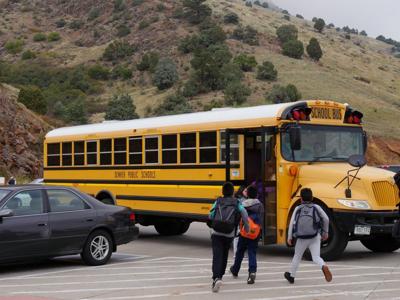Ballot initiative seeks to increase taxes by $1.6 billion; could end Colorado’s Taxpayer Bill of Rights

Amendment 73, the Establish Income Tax Brackets and Raise Taxes for Education Initiative, seeks to amend the state constitution to replace Colorado’s flat rate income tax with a progressive income tax. Individuals earning more than $150,000 would be taxed more and the corporate income tax rate would increase. The revenue collected from the tax hikes would go into a newly created Quality Public Education Fund.
The state constitution requires a 55 percent supermajority vote for the initiative to become law.
A group of opponents of the measure launched a “Blank Check. Blatant Deception. Vote No on 73,” campaign, arguing the ballot language is deceptive. It tried to have the question removed after the required deadline and Colorado’s secretary of state rejected its complaint.
Dave Davia, co-chair of Blank Check and executive vice president and CEO of the Colorado Association of Mechanical and Plumbing Contractors, maintains the amendment’s ballot title “is inaccurate, deceptive and deeply flawed.” The group hopes to “continue to educate Colorado voters to Amendment 73’s unprecedented deception and deceit.”
Advocates for Great Schools, Thriving Communities are holding rallies and using social media campaigns throughout the month of October to persuade voters to support the measure, including having teachers picket at scheduled events for several hours.
In a Colorado Politics’ op-ed, Great Schools, Thriving Communities advocates wrote that the Amendment “freezes the local property tax rate for families, currently the third lowest in the nation, and cuts property taxes on businesses, farmers and ranchers. It only increases the income taxes for the top 8 percent of earners and the corporate tax by a modest 1.7 percent.”
Pfiffner disagrees, arguing that the corporate income tax rate increases by 30 percent and the proposal “would create havoc in Colorado’s already-complex property tax system by doubling the complexity and forcing cuts in county, special district and town taxation, under the Gallagher Amendment rules.”
The amendment comes at a time when “Colorado school funding is at its highest levels ever,” Linda Gorman, a director at the Denver-based Independence Institute, told Watchdog.org. “At current spending levels, there is no correlation between per-pupil state spending increases and achievement. The tax increases are aimed at businesses and ending Colorado's flat tax.”
The amendment also exempts new education spending from the state’s constitutionally mandated limits established by TABOR, she adds.
Gorman authored “What you need to know about Amendment 73 and public education funding,” which explains all of the tax increases associated with the bill. Even if the tax increases were implemented, she argues, “There is no guarantee that more spending will increase educational opportunities for existing students.”
If passed, proponents say Amendment 73 would increase base funding for all students, provide for full-day kindergarten and increase revenue for early childhood education. It also expands the definition of “at-risk” students to include both free and reduced lunches and increases the amount of funding local districts receive for English Language Learners, special education and gifted and talented students.
Proponents argue that public school underfunding “is a state-level problem, so we need a state-wide solution.” On their website, www.yesonamendment73.com, they point to school districts that have consistently tried to raise funds locally through Mill Levy Overrides (MLO) but the amount raised wasn’t enough to offset state budget cuts in some cases.
For example, one mill can raise between $4,000 and $13 million, with the average raising $500,000. The amounts are unpredictable and vary, and are impacted by a local school district's inability “to address the cuts they have received from the state through the Budget Stabilization (Negative Factor),” the site states.
The Independence Institute says “Amendment 73 effectively ends protections against continuous increases in residential property taxes. It increases the state residential property tax assessment rate for school districts” and “reduces legislative oversight by locking increased spending into the state constitution.”
Pfiffner adds, “In short, this measure would damage the way Coloradans treat one another and hurt our economy badly in the long run. We’ve been successful here. Do we want to follow Illinois and California into their fiscal nightmares?”

No comments:
Post a Comment